 |
|
 |
2011
September
29-30
|
Astronomy mode for a 2012 Ford Escape:
a small matter of programming

Disabling unwanted exterior lights actuated by doors
Applicable to other Ford cars, SUVs, and trucks
As delivered, the lights on our new Ford Escape weren't doing quite what I wanted for astronomy observing sessions.
Even with the interior lights turned off, the "perimeter lights" (parking lights and license plate lamp) would
come on whenever I opened a door.
I started imagining electrical modifications, but meanwhile, the dealer
(Akins Ford) called Detroit.
They were told to connect their laptop to the car's OBD port and look at the menus.
Interestingly, the menus reside in the car's firmware and can differ from version to version.
Anyhow, they found two programmable options, Perimeter Lighting and Welcome Illumination,
and disabled them both.
Now, exterior lights don't come on when I open doors or use keyless entry.
The interior lights, of course, are controlled by a switch.
Interestingly, Daytime Running Lights were also a menu item — already disabled.
All these things are fairly often requested by people who go camping with Ford vehicles
and also are needed by law enforcement (police cars have to be able to hide in the dark).
So it makes sense to implement them in software.
Kudos to Andrew Todd and Gerry Carroll at Akins Ford for finding all this out and then doing the
programming for me.
Addendum: After doing these settings, the front parking lights and rear tail lights still
blink on briefly (for perhaps 0.5 second) when you press the "lock all doors" button, either
inside the car or on the key fob. So I don't lock my doors while I'm on the campground at night.
This feature means I can still use the key fob as a car locator, by pressing "lock" rather
than "unlock."
Permanent link to this entry


|
|
2011
September
26-28
|
Farewell, old Olds


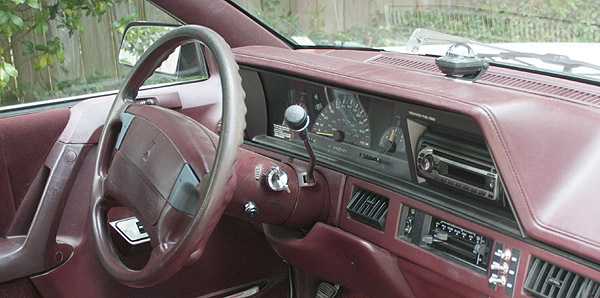

As C. S. Lewis wrote in his autobiography, "There is a 'rumness'
[an uncanny quality] about
even a Windsor chair when it says, 'You shall not see me again.'"
With that in mind, I preserve for posterity some familiar sights I will never see again.
This 1995 Oldsmobile Cutlass Ciera became mine in November 1996, and it has given me fifteen
years of faithful service, marred only by one rather spectacular transmission failure
(back in 2001) and one fuel pump failure that stranded me on the road (in 2010).
Yes, the horn buttons are blue, not red. The story of their replacement was told in
these pages a while back, along with the story of the "emergency prosthetic horn button."
Farewell, trusted steed... Personally, I think this car is a collector's item.
It's currently at Akins Ford in Athens, Georgia.
If you want to snap it up, act quickly, because it will probably go to a
downscale used-car dealer almost immediately.
The new car is a new 2012 Ford Escape.
Yes, I know financially astute
people aren't supposed to buy new cars. The trouble is, everybody knows
that by now; part of the new culture of thrift is that everybody wants a 2-year-old car,
and the result is that you can
get remarkably good deals on new cars, and I did.
We had several motives for getting a new vehicle.
First, ever since giving up our minivan last year, we've lacked anything with appreciable
cargo capacity. Second, and related to that, we haven't had anything very suitable for
astronomy expeditions. And third, most importantly, we wanted the reliability and safety
of a completely modern car. Our two family cars both had over 100,000 miles on the odometer.
They were getting up in years.
Permanent link to this entry


|
2011
September
23-25
|
Short notes
Gadget of the day: People are cloning the
Microchip PICKIT-2
and giving it
sockets for all the PICs, not just a few. Here's an example.
The manufacturer encourages this; the design of the PICKIT 2 is published, and the firmware is a free download.
U.S.
patent law has been overhauled. I have no deep thoughts (yet) about the changes.
The Left has now come up with the idea that
there should be
massive cancellation of student loan debts because those debts are dragging down the economy.
I predicted some discontent about this, but a loan-forgiveness program could be massively unfair
to people who didn't take out student loans (making financial sacrifices that didn't become
loan balances) or,
even worse, people who did borrow, but not through a "student loan" program. Hmmm...
I think that if you want to subsidize education retroactively, you should give people a rebate
on tuition that they paid in the past, regardless of where they got the money to pay it.
The political factoid of the day is that
"47% of American households pay no income tax" (and, implicitly, ought to).
Here is some background
on that, although I'd appreciate a lot more.
Big questions: (1) How many of them shouldn't be paying income tax, by any criterion,
because they're retired people living off their savings? (2) What are you wanting to
change, exactly, and how much difference would it make? If you want to argue that the Earned
Income Tax Credit has gone too far, back it up with facts about that specifically;
don't lump everybody together.
It is not often that you hear a nation clamoring to raise taxes on the poor and lower taxes on the rich.
It sounds like a rather confused clamor, if you ask me.
Permanent link to this entry
Ramsey on management
Dave Ramsey's
EntreLeadership
(entrepreneurial leadership)
book has come out and I've read it. No time for a full review right now, but here are a few remarks.
It may be Dave Ramsey's best book. It is certainly a "how I did it" book, not a mangement theory book.
You can use it as data even if you don't use it as theory.
As with everything else from Dave Ramsey, when he says something will work, he's generally
right, but when he says that the alternative is foolish, I don't necessarily agree.
He admits he learned things the hard way, and
he lays bare his own biggest fault, which is a tendency to assume that everyone's mind works like
his own. He admits some surprise in discovering that some people are "koalas" rather than "tigers,"
meaning they aren't fearless and hard-driving like him, yet in spite of their low-key manner, they do
tremendous amounts of valuable work.
He considers moral character very important (as I do) and will fire employees for marital infidelity.
He figures that if your spouse can't trust you, neither can your employer. I agree profoundly.
Perhaps the worst thing to come out of the "sexual revolution" was the notion that a person can live a
split life, honest in the daytime and totally perfidious at night.
A management problem I've never run into: He apparently has had a problem with employees getting addicted
to pornography and using the employer's computers to view it. He considers this a character defect and
insists that they either mend their ways or leave. That's how I'd feel too — viewing porn on a computer
can do terrible things to the computer! (Viruses, malware, etc.; never mind what it does to people.)
I have not run into this one at UGA, not because our people are especially virtuous,
but because they're smart enough not to use the employer's computer for
things they don't want the employer to know about.
His famous "no gossip" policy is a good idea, but he uses the word "gossip" in an odd way.
I would call it "grumbling." The policy is that you don't complain
about any aspect of the company or workplace unless you're
talking to someone who can correct it.
People who think they're supposed to (claim to) hate their jobs are not good employees.
When hiring someone, he does a bit of financial counseling: he asks the new employee for a budget.
The reason is, things go very badly if an employee's salary isn't enough for him to pay his bills.
Sometimes, people who are panicked about unemployment will take a job like that.
At best, the employee will leave quickly for another job. At worst, he'll stay and hate you.
Summary: Recommended.
Permanent link to this entry


|
2011
September
22
|
Return of a familiar face

All through the 1970s, when I wanted to know what time it was, this is what I looked at
— a "Bulova 23" self-winding watch. I started wearing my father's watch around 1968,
wore it every day until Melody gave me a digital watch around 1980, and continued wearing it
on special occasions until it disappeared while we were moving in 1984. I don't know if it was
stolen or just packed up somewhere, perhaps with my mother's belongings.
This year, for my birthday, Melody gave me a watch of the same kind (from eBay), and we had
it overhauled by a watchmaker. I'm enjoying seeing the familiar face again, although once I've
made sure it runs well, this will be my "dress-up" watch, not my "work" watch.
The model is known as Bulova 23 and was quite popular in its time (1954-58; the new one has a
1958 date code). The movement is Swiss-made. Early indications are that this one gains
about 15 seconds a day, which is as it should be — it's much easier to set this kind of
watch back a fraction of a minute, by stopping it, than to set it forward.
(Many watches stop when the knob is pulled out. This one doesn't do that, but
it stops when you apply slight pressure
in the direction of setting it backward.)
"Self-winding" means it engages in "energy harvesting" as we now call it. Bodily movements
are converted into energy to power the watch. This is done by a weight that swings around as
I move my arm throughout the day.
For my heirs, or anyone who may eventually find either this watch or my father's watch,
let me record that the serial number of the "new" Bulova 23 is 6328976 and the rest of the
writing on the back cover is very shallow. Somewhere I have the serial number of my father's
watch, and I recall that the writing on its back cover was more legible.
If the original watch eventually surfaces, that is how we will tell them apart.
Permanent link to this entry


|
2011
September
20-21
|
Setting up SunTrust in Quicken — again
SunTrust has modified its web site, and this made Quicken lose the ability to
download my transactions. To fix it, I did roughly the things described
here, but with slight tweaks. Namely:
- In Tools, Account List, "edit" each of the SunTrust accounts and remove it
from One Step Update.
- In what follows, give the financial institution name as "SunTrust Banks"
(which is not on the first menu) rather than "SunTrust Bank" (which is).
(This quirk may be unnecessary — I'm not sure.)
- In Tools, Add Account, tell Quicken you want to set up a new account,
such as a credit card, at "SunTrust Banks."
- Quicken will go on line and find your SunTrust accounts. Link each of
them to an existing account rather than setting up a new one.
*Sigh of relief* It works! I also had to deactivate and reactivate downloading
of my Discover Card account today; it was "downloading" but not picking up new
transactions.
Permanent link to this entry


|
2011
September
19
|
The etymology of tragedy
One of the long-standing puzzles of language history is the origin of the word tragedy.
The word comes from the ancient Greek word tragōidia, which meant the same
thing, so the origin of tragōidia is what we really want to know.
Everybody agrees that -ōidia means 'song,' and in fact comedy
comes from kōmōidia 'revelry song' — that much is clear.
The puzzle is what trag- means. It puzzled even the Greeks, who could only
identify it with their word tragos 'goat' but had no memory of what goats might
have to do with dramatic performances.
It's possible that the connection to goats was simply forgotten in preclassical times.
But there might be another explanation.
What if trag- came from a different Greek word, which was otherwise forgotten?
Things like that happen in English; consider our word huckleberry, and recall that
huckle is no longer a word, although at one time it meant something.
Greek belongs to the Indo-European language family, which means it is distantly related
to some other ancient languages, including Latin, Old Irish, Old Norse, and Gothic.
Combing through those languages, Louis H. Gray (Classical Quarterly VI.60, 1912)
found a word that might have come into Greek as trag- and meant 'terror' or
'courage.'
So if that is right, a "tragedy" is a "song of courage." That makes a lot more sense to me
than the goat story does.
Permanent link to this entry


|
2011
September
18
|
How to remove Linux from a Windows/Linux dual-boot system
A while back I talked about
how to clean up
if you did things in the wrong order.
Today I want to describe the right way to remove Linux from a
Windows/Linux dual-boot system that uses Linux's GRUB boot-menu system
(which is the usual way to do it).
(1) Within Windows, download MBRFIX and run it.
Now Windows is the only OS you can boot, and the GRUB menu is gone.
(2) Right-click on Computer, Manage, Disk Management, and delete the volumes that belong
to Linux. Then, you can probably use Extend Volume on your Windows volume to add the
extra space to it, or you can reformat them as Windows volumes.
I'm not giving up on Linux! But I mostly run Linux and Windows on separate
computers now, and I'm getting ready to dual-boot Windows 7 with various
test releases of Windows 8.
Or I may put Windows 8 into a virtual machine. Either way, I need the disk space.
Permanent link to this entry


|
2011
September
17
|
A logic poem (not entirely original)
Roses are red,
Violets are blue,
The fourth line is false
But the third line is true.
Permanent link to this entry


|
2011
September
15-16
|
Advice to those who want to test us
Today I took the University's mandatory yearly computer security test, required of all
employees.
It was a pretty well-constructed test.
I chose to take the quiz without viewing the videos first,
and I scored 91%, which was passing. It would have been helpful if they had told me
what I got wrong, so that I could have reviewed the appropriate videos
(any of about 10 on different subjects).
This test brought to mind my memories of other on-the-job training and testing experiences
that were much worse.
So here's some advice for people who administer training and tests to people on the job.
(1) Know what you're testing. You need to have in mind a coherent body of knowledge or skills.
A test isn't a trivia quiz. The point of games like Jeopardy and Trivial Pursuit is that
they aren't organized; the questions are about petty, unrelated things.
That's not how it's supposed to be when you're measuring knowledge of something specific.
You need a clear sense of what is most important and what is less important.
If things are totally unimportant, they shouldn't be on the test!
I think software certifications cross the border into trivia when they start testing whether
you've memorized keystroke combinations rather than understanding what the software does.
(2) Don't put in nonsense just to "make the test harder." Some test-writers seem
to think 100% success is something that must be prevented at all costs. So they include
questions that are irrelevant, trivial, off the wall, or even just plain wrong, to keep anyone from
scoring 100%. In the real world, if the test measures knowledge that people should have,
then some of them should ace the test. That's what it's for.
This is related to the issue of "trick questions." Some people think any question is a "trick" if its
answer can't be guessed. That is false. There is no reason the answer to every question should be
in the middle of a scale, or anything like that; we're testing knowledge, not testmanship.
On the other hand, questions actually designed to trick people are bad form. They aren't
really testing knowledge of the subject. And they often trick the examiner — I've come
across numerous situations where the "correct" answer to a trick question was demonstrably wrong.
(3) Don't test on arbitrary classifications made up by the teacher. The test should be
about the subject, not about the teacher's quirks.
If an expert in the subject can't ace the test
without seeing the teacher's personal way of presenting it, then the teacher is being a bit of a prima donna.
Yet this seems to be common in the business world.
Related to this, don't put trivia into the test to see if people "were awake" or were
present at a particular presentation. Test the subject.
Finally, and above all, use tests to promote learning, not to scare people or disqualify
a percentage of them. A fool can ask more than ten wise men can answer.
Anybody who misses any questions on a test needs to be told what they were, so he or
she can fill gaps in his or her knowledge.
Permanent link to this entry
Some of our e-mail was lost in the mail
From about 5:30 p.m. EDT on the 14th until 11:15 a.m. on the 15th, the @uga.edu
e-mail server lost some of the incoming e-mail, irretrievably.
Pieces of e-mail didn't reach us, the senders weren't notified, and there is no way to
get the missing mail back.
This resulted from a security-related mishap. I don't know what I missed.
Permanent link to this entry


|
2011
September
14
|
Cake day

I think Melody and Sharon are trying to sabotage my diet. Yum!
Permanent link to this entry


|
2011
September
12-13
|
Here come the non-SLR DSLRs
I have long expected that digital SLR cameras would one day be replaced by
cameras that lack the unnecessary parts of the SLR.
You need interchangeable lenses, a large sensor, and a display screen.
You don't need a mirror and viewfinder of the type we had on film SLRs.
Its only purpose, really, is to enable you to aim and focus with the camera
turned off — and who needs to do that?
Some promising "mirrorless cameras"
are reaching the market. So far, none from Canon, and only a rumor of one from Nikon. Let's see what transpires.
Permanent link to this entry


|
2011
September
11
|
We remember...

Permanent link to this entry


|
2011
September
9-10
|
Adobe CS 5.5 always reports installation problems
Having switched to DeepSkyStacker for astrophotos, I didn't feel a pressing need to update or
replace MaxIm DL, so I spent some money updating Photoshop instead, from CS3 to CS5.5. To be
precise, I got Adobe Creative Suite 5.5 Web Premium, Student and Teacher Edition.
(Maybe I'll finally learn Dreamweaver and Flash.)
So I deactivated CS3 and deinstalled it from both my desktop and my laptop.
Then I installed CS5.5.
And on both machines, the installer reported that there were problems with the installation
and I should do it over.
The first time, on the desktop, I seem to have actually needed to do this.
(Word to the wise: Turn off the antivirus and don't run anything else, certainly not
a web browser, while Adobe is installing.) But the second time, it still complained of
a few errors.
Looking at the log, I couldn't see that they were serious, and the software appears to work,
so I figure Adobe's installer has just cried "wolf" (as it did also on the laptop), and Adobe Update will
probably be all too eager to fix anything that still needs fixing.
BTW, the best thing about Photoshop (CS3 and up) is the "reduce noise" feature, which reduces
the speckle and color fluctuations in pictures. It is similar to Neat Image though less powerful.
I may also look into getting some astronomy-specific Photoshop add-ons.
Busy season: I have so much work piling up that you wouldn't believe it.
The students get brighter and more numerous every year, and I don't.
Our financial AI group is off to a good start,
and I've also made some interesting and worthwhile contacts at Four
Athens. And I have speaking engagements
coming up. It's September, and people are realizing that it's time to get on with the school year,
which started three weeks ago!
If you are a really good C#/ASP.NET/LINQ programmer, and want a job, please contact me immediately.
I know someone who is recruiting in Athens, Georgia.
Permanent link to this entry


|
2011
September
7-8
|
C# garbage collection done right
I have my head down doing work, but at least I can blog about the work.
Today's discovery:
In C#, System.GC.GetTotalMemory(true)
is much more powerful than System.GC.Collect().
The former launches a full garbage collection (memory reclamation) and waits for it to
finish (or until a brief time limit has expired).
The latter starts it but then proceeds without waiting.
There are other ways to wait for a GC to finish. You can launch it with
System.GC.Collect() and then call
either
System.GC.WaitForPendingFinalizers(),
which works like a charm except that it's not guaranteed to terminate at all
in some threading situations, or the convenient
but unrecommended Application.DoEvents().
More here.
Another C# hint: If your program crashes, it may be running out of memory.
That's the only kind of error it can't trap. And it may mean you need more
garbage collections — hence the preceding note.
Worth watching: A new technology incubator
(i.e., an organization that fosters new computer-related businesses)
called Four Athens.
Everybody important hangs out there — and so do I.
Permanent link to this entry


|
2011
September
6
|
Correcting color misalignment on a color laser printer
If the colors from your laser printer seem a bit mushy or blurred, here's a
case worth studying.
The patient, a Hewlett-Packard CP1518n color laser printer.
The symptom, a magenta image displaced upward from the main one.
On close examination, there was also a yellow ghost image.
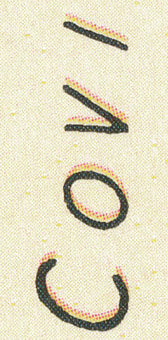
(You're looking at this the right way, with the top of the paper up;
the writing happened to run vertically in this sample.)
The cure? Press the Menu button on the printer, find "Calibrate," and do it.
Here you see the Windows logo from a printer test page before and after calibrating.

Permanent link to this entry


|
2011
September
5
(Extra)
|
More co-authored astrophotos
On August 28, Douglas Downing and I were able to go out in the country
and take pictures away from the glow of city lights.
All of these are stacks of 3-minute exposures with a Canon XSi and
Canon 300-mm f/4 lens with a converter making it 420 mm, f/5.6.
The comet is a stack of two exposures, and M101, a stack of six;
the rest are stacks of five. Some are enlarged much more than others.
The galaxy M101 with the supernova and another galaxy:
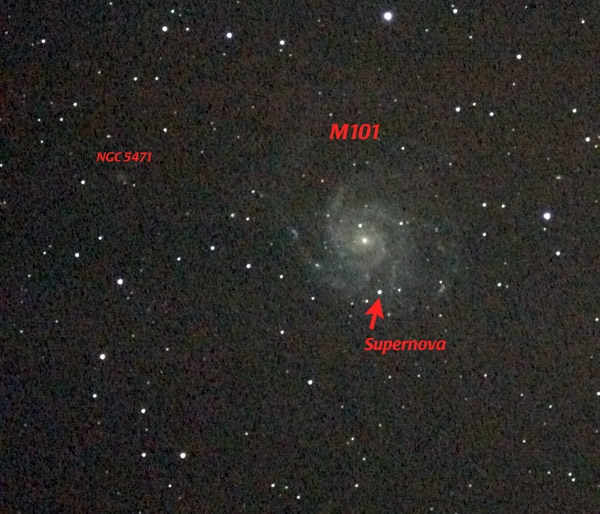
Comet C/2009 P1 Garradd again, against a darker sky than yesterday:
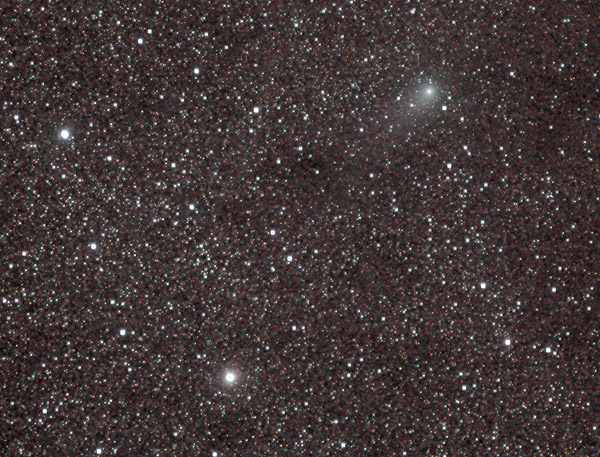
The Veil Nebula, a supernova remnant in Cygnus:

The North America Nebula, which I can't resist
photographing at every opportunity:

And finally, the Andromeda Galaxy (M31) with its two
satellite galaxies:

Permanent link to this entry


|
2011
September
5
|
How I use DeepSkyStacker and Photoshop
This material has been moved. Please click here to see the updated version.
Permanent link to this entry


|
2011
September
4
|
Co-authored astrophotos from August 27
On the evening of August 27, Doug Downing and I again used my telescope
and his camera to take some astronomical photographs. These were taken
at my home in Athens, Georgia.
Each is a stack of several 3-minute exposures with a Canon XSi and a 300-mm
f/4 lens with an extender, giving 420 mm and f/5.6.
I am now doing my image processing with
DeepSkyStacker, which is
freeware and includes a very
useful "comet stack" mode, where a comet, moving relative to the stars,
is digitally subtracted from the picture, aligned and stacked separately,
and put back in. I used that to process this series of 3 exposures
of Comet C/2009 P1 Garradd and the star cluster M71:
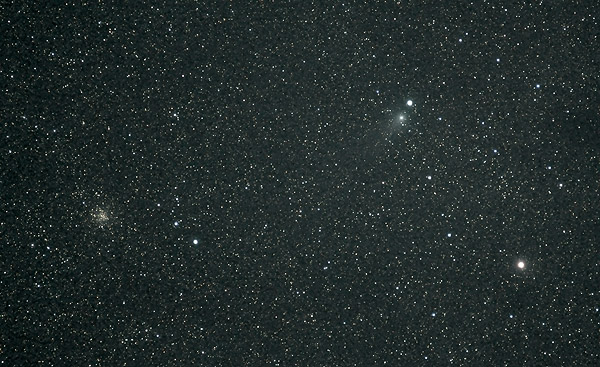
Same picture, enlarged:

Here's a stack of 7 exposures of the Eagle Nebula (Pillars of Creation, M16):

And here's a mysterious star field in Corona Australis which we photographed
because Doug lives in Seattle and rarely gets to photograph anything so far south.
It contains the globular cluster NGC 6723; to its lower left, a bright double star
surrounded by faint reflection nebulosity, NGC 6726-6727; and to the lower left of that,
a pair of stars connected by an unusual variable emission nebula, NGC 6729.
We should go at this one again from a darker-sky site.

Finally, here's the so-called Coathanger asterism, a group of stars that looks
like an upside-down coathanger, with a faint star cluster at the left:

Permanent link to this entry


|
2011
September
1-3
|
Slow-starting September
Eventful August is over, and if it looks like September is slow getting started,
it's because I'm deluged with work — in a good way. New opportunities are
opening up every day. The University's school year is off to a lively start; we have
a good crop of new students.
And I'm finally authorized to reveal that I'm doing a
consulting job for FormFree — the company
that will revolutionize banking in North America — though I can't tell you
exactly what I'm doing. All will be revealed when the time is ripe.
Doug Downing and I took a lot of astrophotos last week. I'm going to process them soon,
after I finish comparing several different kinds of software for doing so.
And look at my speaking calendar!
Permanent link to this entry


|
|
|
This is a private web page,
not hosted or sponsored by the University of Georgia.
Copyright 2011 Michael A. Covington.
Caching by search engines is permitted.
To go to the latest entry every day, bookmark
http://www.covingtoninnovations.com/michael/blog/Default.asp
and if you get the previous month, tell your browser to refresh.
Entries are most often uploaded around 0000 UT on the date given, which is the previous
evening in the United States. When I'm busy, entries are generally shorter and are
uploaded as much as a whole day in advance.
Minor corrections are often uploaded the following day. If you see a minor error,
please look again a day later to see if it has been corrected.
In compliance with U.S. FTC guidelines,
I am glad to point out that unless explicitly
indicated, I do not receive payments, free merchandise, or other remuneration
for reviewing or mentioning products on this web site.
I have a Canon EOS 20Da camera and a Tektronix
TDS 210A oscilloscope on long-term loan from their manufacturers. Other reviewed
products are usually things I purchased for my own use, or occasionally items
lent to me briefly by manufacturers and described as such.
|
|























